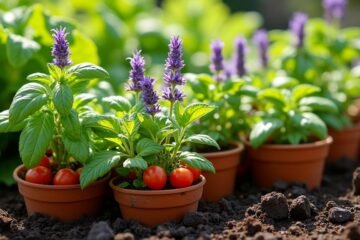Using organic techniques in container vegetable gardening means you’re creating your own little green paradise! Picture biting into a juicy, flavorful tomato that bursts with sunshine and love. By choosing organic seeds and natural methods, you’re keeping chemicals at bay, which is great for you and the environment! Plus, with clever tricks, like companion planting, you’ll have a thriving ecosystem that even ants would envy. Want to know more secret garden hacks? Stick around!
Benefits of Organic Gardening
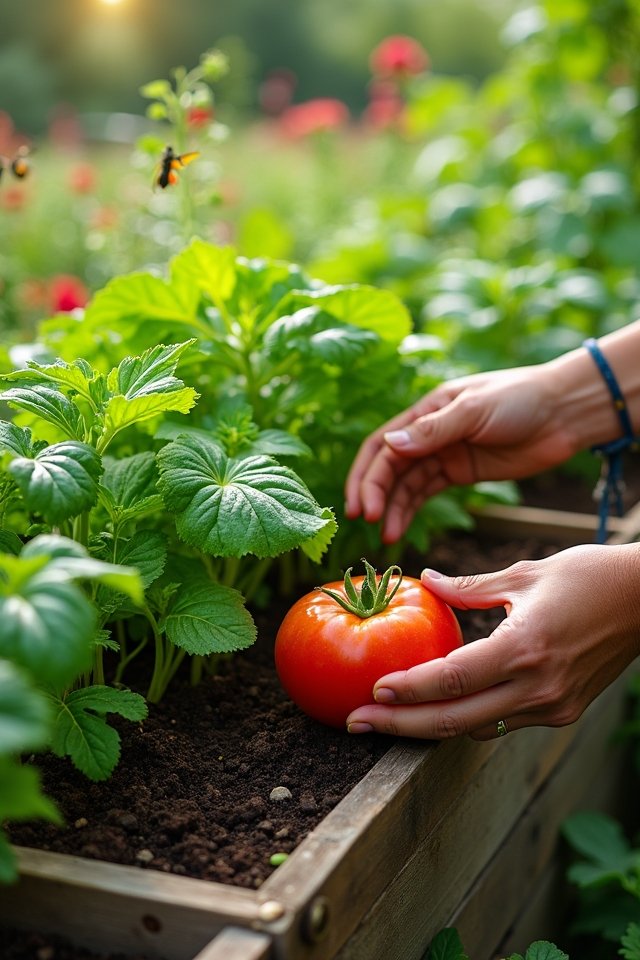
When you plunge into organic gardening, you’re not just growing vegetables; you’re joining a vibrant, eco-friendly revolution! Imagine biting into a juicy tomato, bursting with flavor and nutrients—now that’s a health benefit you can savor! You’ll also be nurturing your soil health, creating a thriving ecosystem beneath your feet. Picture rich, dark soil teeming with life; it’s like a bustling metropolis for earthworms and microbes! By using organic techniques, you’re ditching harmful chemicals, so your garden’s not just safe but also supercharged with goodness. Isn’t it exciting to know your efforts lead to healthier meals and better environments? You’re cultivating more than plants; you’re harvesting happiness, sustainability, and a delicious connection to nature! Let’s dig in!
Choosing the Right Containers
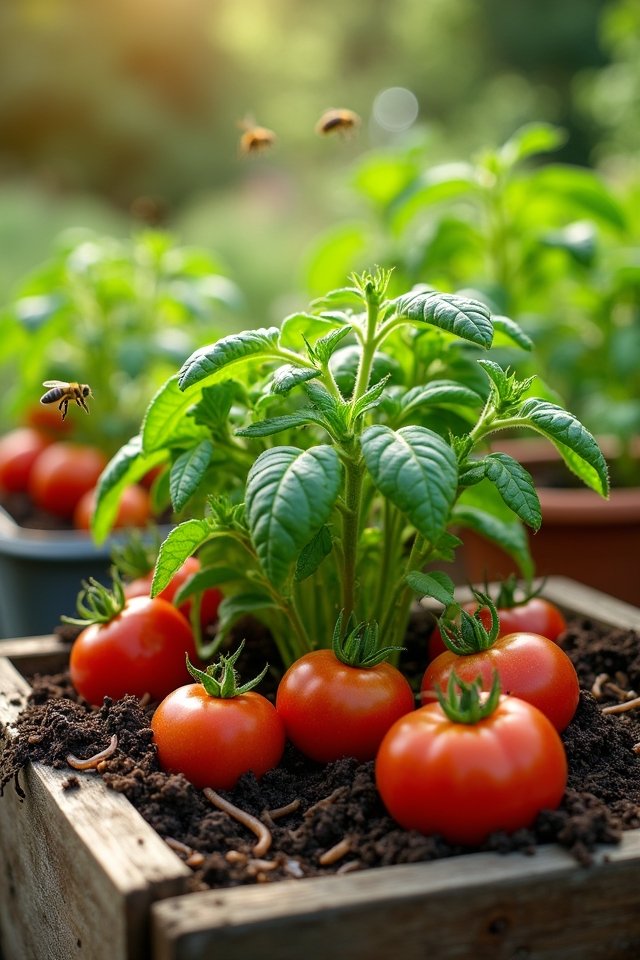
Picking the right containers can make you feel like a kid in a candy store—except instead of sweets, you’re surrounded by vibrant pots, colorful planters, and charming boxes that can turn your balcony or patio into a green paradise! When choosing, think about your container materials. Are you drawn to stylish terracotta, durable plastic, or eco-friendly biodegradable options? Each has its perks!
Consider these size considerations:
- Small containers for herbs or salad greens—perfect for quick snacks!
- Medium pots for tomatoes and peppers, offering enough room for roots to stretch.
- Large boxes for a mini vegetable garden—think of it as your own backyard buffet!
Selecting Organic Soil and Amendments
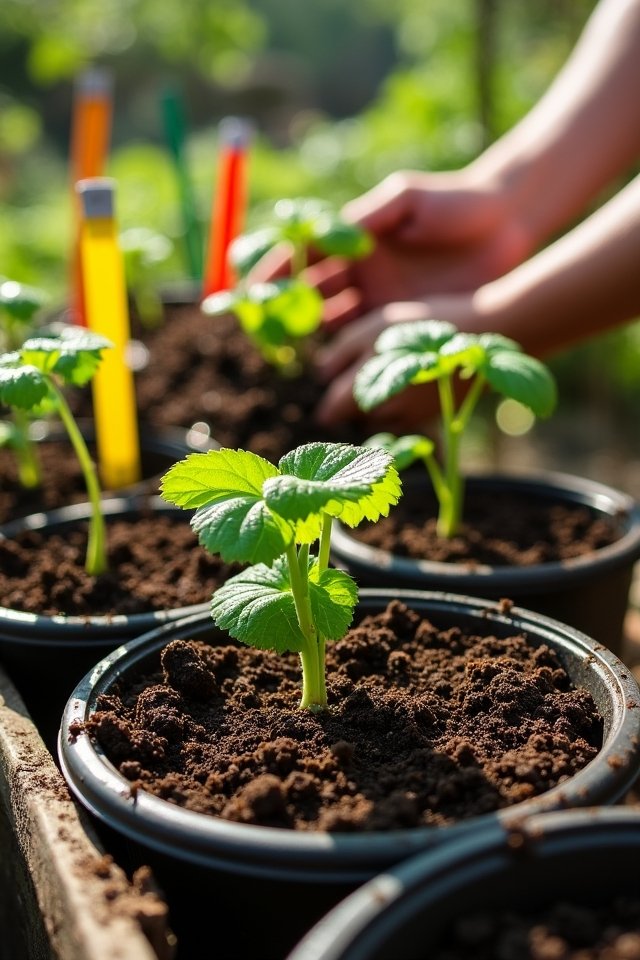
To grow thriving vegetables in your containers, you need to guarantee you’re using the best organic soil and amendments—because let’s face it, even the most vibrant pots won’t do much with sad, lifeless dirt! Start by choosing the right soil types; a well-draining mix with compost and peat moss does wonders. It’s like a cozy bed for your roots! Then, don’t forget about organic amendments! Things like worm castings or bone meal can boost fertility and enhance taste—just imagine those juicy tomatoes bursting with flavor! Mixing in some perlite or coconut coir helps aerate the soil, giving plants room to breathe, much like you after a good stretch! So, dig in and create a thriving garden oasis!
Companion Planting for Pest Control
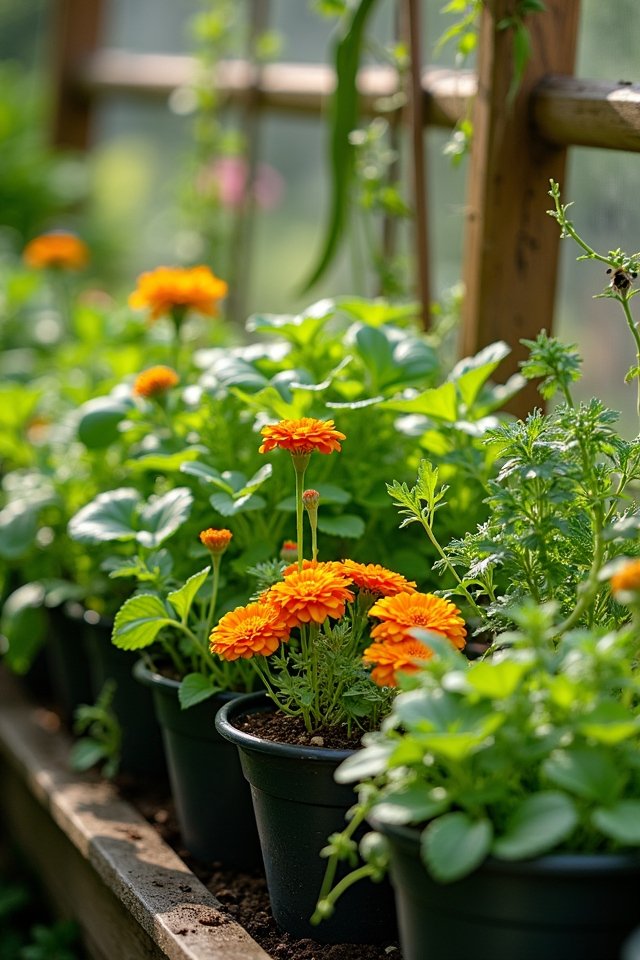
Did you know that some plants make better friends than others? In your container garden, companion plants can work wonders as natural pest deterrents! They help repel pesky bugs while boosting growth and flavor. Here’s how you can mix things up:
- Basil and Tomatoes: They’re like best buddies! Basil not only enhances tomato flavor but keeps those pesky flies at bay.
- Marigolds and Green Beans: These vibrant flowers attract beneficial insects while warding off unwanted pests.
- Cilantro and Spinach: This dynamic duo keeps aphids away while you enjoy fresh salads!
Organic Pesticides and Herbicides
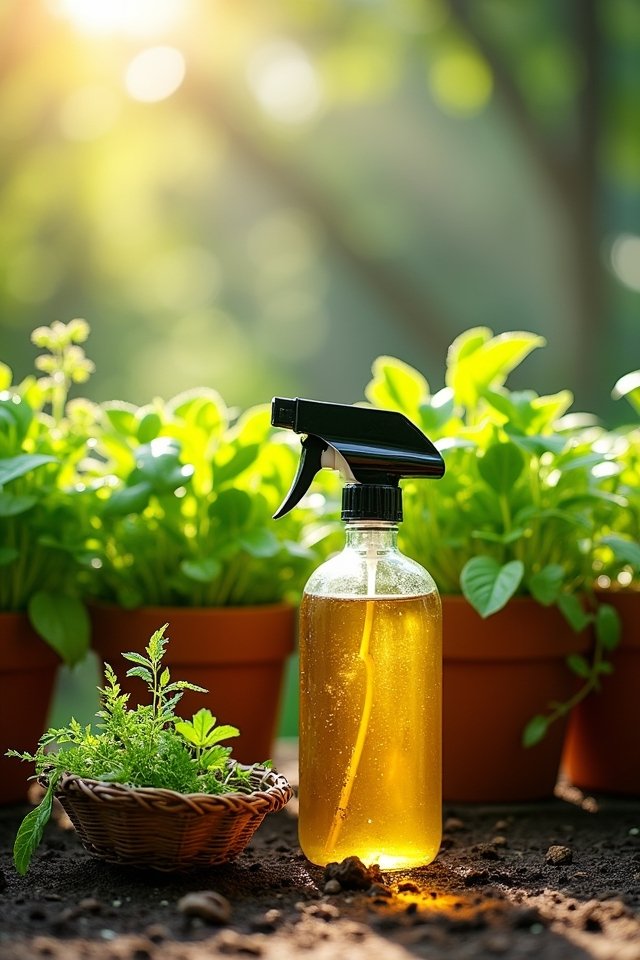
While companion planting can keep pests at bay, sometimes things get a bit out of hand, right? Enter organic pest control and natural herbicides—your superhero duo in the battle against garden invaders! Imagine spritzing a solution of neem oil, derived from the neem tree, creating a hostile environment for munching pests. Who knew being a pest could be so dangerous? For those pesky weeds, vinegar can be your trusty sidekick, burning away unwanted competition without harming the earth. Plus, these methods are safe for your veggies and the critters you love. Why not give them a try? It’s all about creating a healthy ecosystem in your container garden, and you’ll love the fresh flavors your veggies bring! Happy gardening!
Watering Techniques for Container Gardens
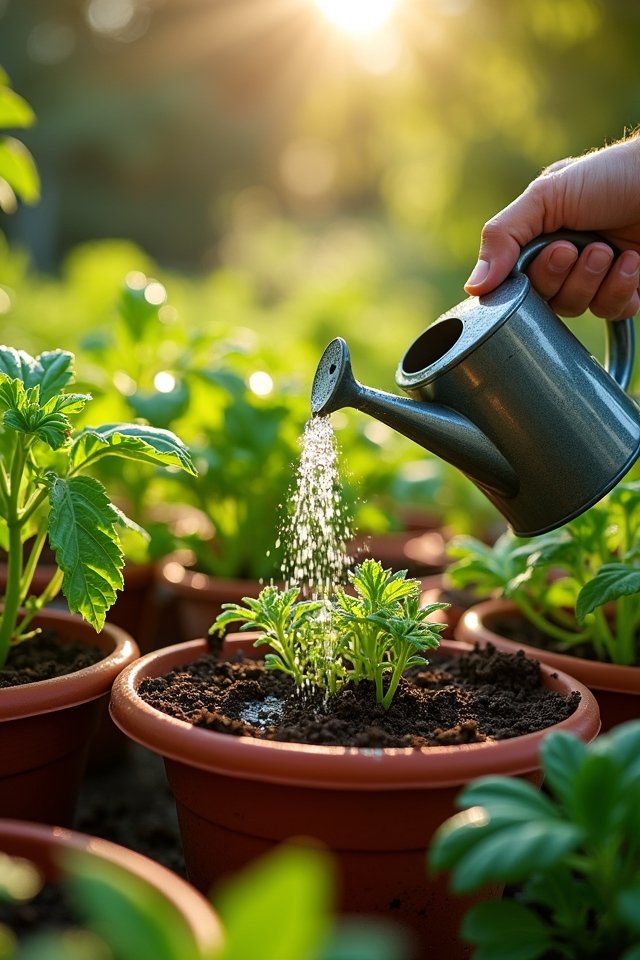
When you’re cultivating a vibrant container garden, effective watering techniques are vital to keeping your plants happy and healthy! Here’s how to elevate that watering game:
- Check drainage solutions: Always guarantee your pots have holes to prevent water from pooling like a tiny swamp!
- Use moisture retention: Incorporate coconut coir or compost to hold onto water longer, so your plants don’t feel parched.
- Water at the right time: Early mornings or late afternoons work wonders, as the sun’s not competing with your watering can!
Fertilizing With Organic Solutions
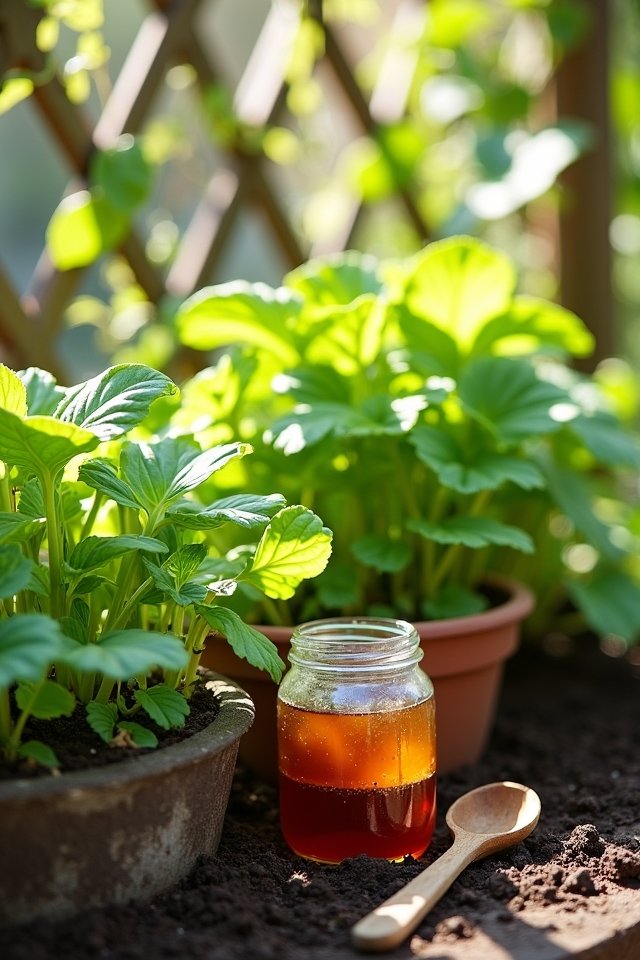
How can you transform your container veggies from average to extraordinary? Search no further than organic fertilizing! Feed your plants with natural fertilizers that nourish them like a warm hug from the sun. Try using compost tea—it’s like a spa day for your veggies! Simply steep compost in water, and voilà! You’ve got a nutrient-rich potion that’ll make your greens sing with joy. Picture vibrant tomatoes bursting with flavor, and zucchini that practically dances off the vine! Remember, your plants crave love and attention, so don’t skimp on the good stuff. Accept these organic solutions, and watch your container garden thrive like never before. Happy gardening! Let’s turn those little pots into powerhouses of produce!
The Importance of Crop Rotation
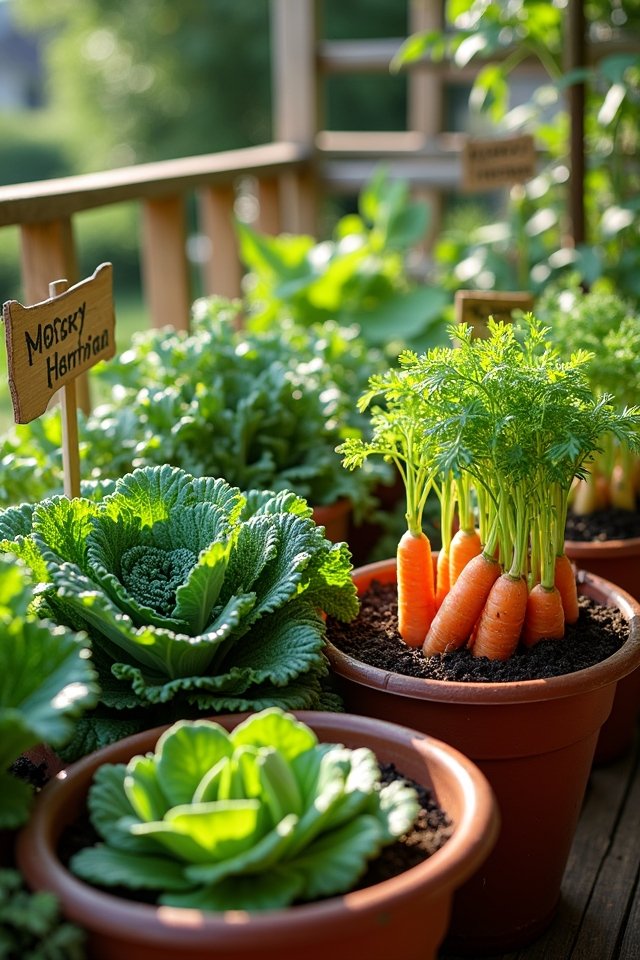
Have you ever noticed how tired a garden can get if you don’t switch things up? Just like you need a change of scenery, so does your soil! Crop rotation is a game-changer for enhancing soil health and promoting crop diversity. By changing your veggies year after year, you keep pests guessing and nutrients balanced!
- Boost soil nutrients naturally.
- Reduce the risk of diseases.
- Keep your garden ecosystem thriving!
Imagine planting vibrant tomatoes one season, then lush beans the next. This not only refreshes your soil but invigorates your entire gardening experience! So, don’t let your garden feel weighed down—keep it lively and exciting with smart crop rotations! Your plants will thank you, trust me!
Sustainable Pest Management Strategies
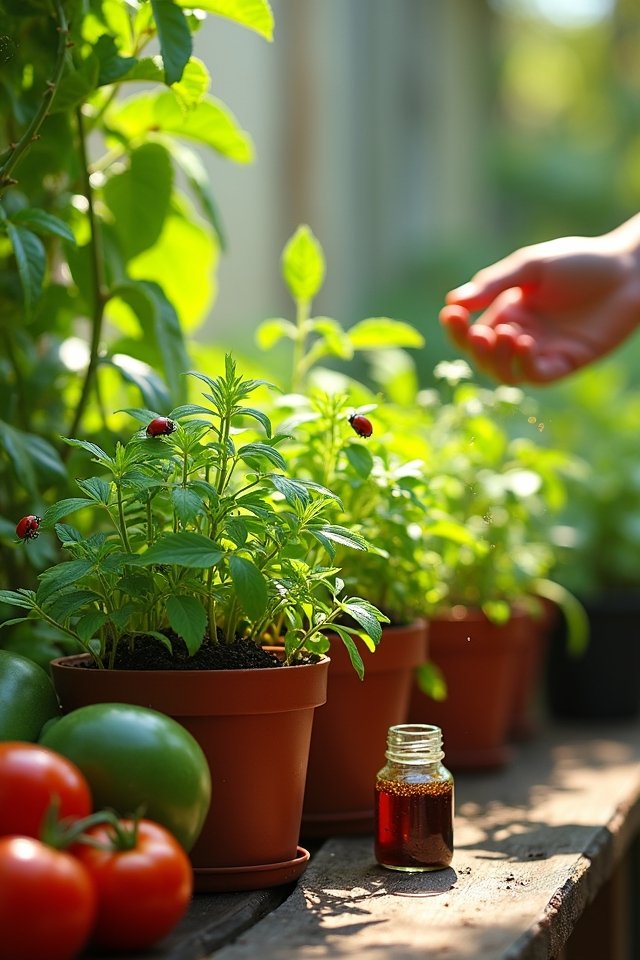
While your veggies are growing, pesky pests might be plotting their next snack! But don’t worry, you’ve got innovative tools at your disposal. Adopt biological controls, like ladybugs and lacewings, which feast on unwanted critters. Imagine having an army of nature’s little protectors! You can also craft natural repellents using garlic or hot pepper spray—just think of it as superhero armor for your plants! These concoctions can deter many common pests while keeping your garden eco-friendly. And don’t forget the power of companion planting! By pairing certain vegetables, you’ll create a fragrant fortress that confuses those munching invaders. So, keep your garden delightful and dynamic, enhancing those delicious veggies while keeping the pests at bay! Isn’t that fantastic?
Harvesting and Storage of Organic Vegetables
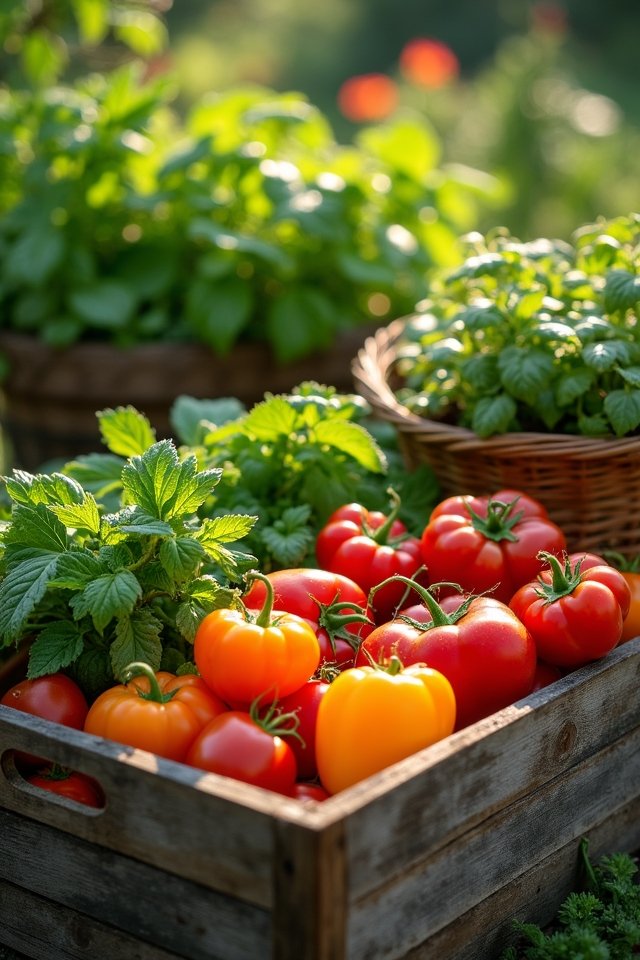
As your organic vegetables reach their peak ripeness, getting ready to harvest is like preparing for a grand feast! Each moment you delay, that ripe tomato or crisp bell pepper becomes even tastier. Timing your harvest is essential; you’ll want those veggies bursting with flavor!
- Check for firmness and color; they should shine like jewels!
- Snip, twist, or pull gently to avoid damage; think of it as a delicate dance!
- Store your veggies properly to keep them fresh; it’s all about that magic touch!
Environmental Impact of Organic Gardening Techniques
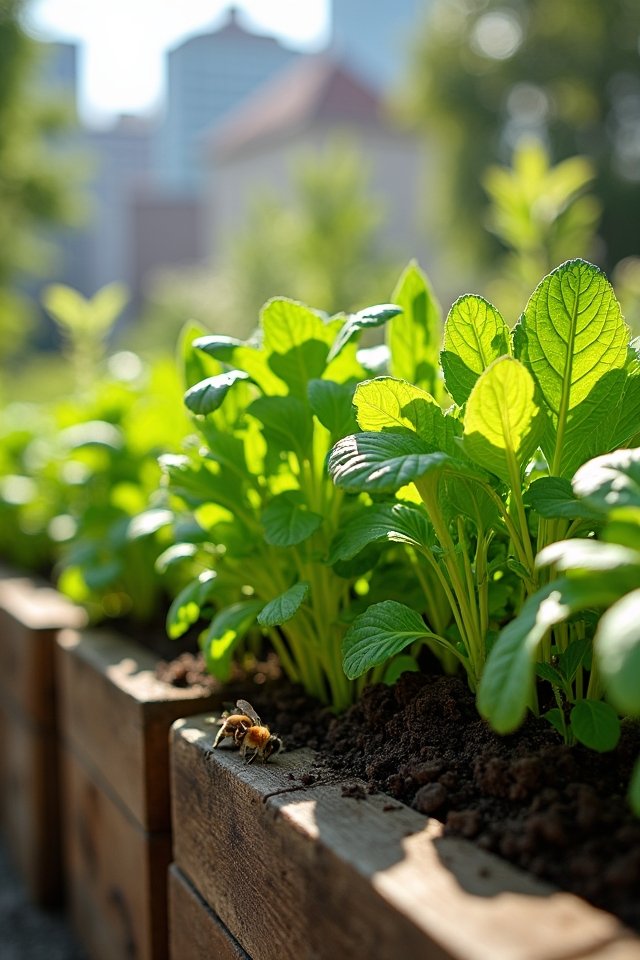
When you immerse yourself in organic gardening, you’re not just nurturing your veggies; you’re also giving Mother Earth a big, loving hug! By opting for organic techniques, you’re boosting soil health through natural compost, which nourishes your plants and keeps your soil alive with beneficial microorganisms. Isn’t that cool? Plus, embracing biodiversity benefits means you’re inviting a variety of critters—like bees and ladybugs—into your garden party, helping pollination and pest control. Instead of using harsh chemicals, your container garden becomes a mini-ecosystem, thriving in harmony! You might even feel like a superhero for protecting our planet! So, grab those organic seeds and let’s cultivate not just veggies, but a healthier Earth, too! Isn’t that rewarding?
Frequently Asked Questions
Can I Use Regular Seeds for Organic Container Gardening?
You might be wondering about using regular seeds in your organic container garden. While they’re perfectly fine, organic seeds bring incredible benefits! Think of organic seeds as the superheroes of gardening—packed with energy and resilience. Plus, you’ve got amazing seed sourcing options, from local farmers to specialty shops. Imagine growing tasty tomatoes or crunchy carrots that burst with flavor! So, why not adopt organic seeds for a garden that truly shines? Happy planting!
How Often Should I Replace My Container Soil?
Think of your container soil like a beloved, well-worn couch – comfy, but eventually it needs a facelift! You should replace your container soil every year, especially if you’re growing heavy feeders like tomatoes or peppers. Regular soil maintenance guarantees nutrient-packed soil for vibrant plants. If you notice it’s compacted or draining poorly, it’s time for a refresh! Remember, happy soil means happy plants, and who doesn’t want a flourishing little garden?
Are Organic Gardening Techniques More Expensive?
You might think organic gardening techniques are pricier, but let’s break it down! Sure, the upfront costs can seem high, but consider the long-term benefits. Healthier plants lead to tastier veggies! Picture biting into a juicy tomato bursting with flavor. Plus, using natural methods can save you money on chemicals and fertilizers over time. Think of organic gardening as an investment in your health—it pays off deliciously! Who wouldn’t want that? Happy gardening!
Can I Mix Organic and Non-Organic Plants in One Container?
You might think mixing organic and non-organic plants in one container is a wild ride, but it can get complicated! Plant compatibility is key for container health. Imagine a vibrant tomato plant getting cozy with a synthetic-fed basil—yikes! It might not thrive. If you do mix, balance them wisely and watch for signs of stress. Just remember, healthy plants lead to tasty veggies, and who doesn’t want that flavorful harvest?!
How Do I Store Leftover Organic Seeds?
So, you’ve got leftover organic seeds? No worries! For stellar seed preservation methods, grab some airtight seed storage containers—think mason jars or sturdy envelopes. Keep them in a cool, dark spot, like a pantry, away from moisture and heat, where seeds can hibernate like little superheroes! Label each container with your seed type and date, so you won’t have a “mystery seed” surprise next planting season! Happy gardening! 🌱


